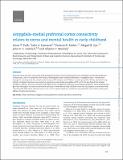Amygdala–medial prefrontal cortex connectivity relates to stress and mental health in early childhood
Author(s)
Park, Anne T; Leonard, Julia Anne; Saxler, Patricia Kasak; Cyr, Abigail B.; Gabrieli, John D. E.; Mackey, Allyson P; ... Show more Show less
DownloadPublished version (411.9Kb)
Terms of use
Metadata
Show full item recordAbstract
Early life stress has been associated with disrupted functional connectivity between the amygdala and medial prefrontal cortex (mPFC), but it is unknown how early in development stress-related differences in amygdala-mPFC connectivity emerge. In a resting-state functional connectivity (rs-FC) analysis with 79 four- to seven-year-old children, we found a significant correlation between more adverse experiences and weaker amygdala-mPFC rs-FC. We also found that weaker amygdala-mPFC rs-FC was associated with higher levels of aggressive behavior and attention problems. These findings suggest that the impact of stress on emotional circuitry is detectable in early childhood and that this impact is associated with mental health difficulties. Connectivity in this circuit may be useful as a marker for mental health risk and for tracking the efficacy of early interventions.
Date issued
2018-03Department
McGovern Institute for Brain Research at MIT; Massachusetts Institute of Technology. Department of Brain and Cognitive SciencesJournal
Social Cognitive and Affective Neuroscience
Publisher
Oxford University Press (OUP)
Citation
Park, Anne T. et al. "Amygdala–medial prefrontal cortex connectivity relates to stress and mental health in early childhood." Social Cognitive and Affective Neuroscience 13, 4 (March 2018): 430–439 © 2018 The Author(s)
Version: Final published version
ISSN
1749-5016
1749-5024